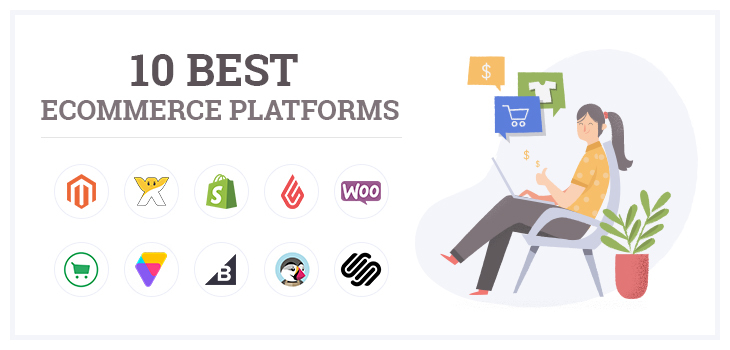
According to Statista, retail eCommerce sales were 2.3 trillion US dollars in 2017. These numbers are expected to touch 4.8 trillion US dollars in 2021.
Here’s a sure shot: eCommerce industry is growing at a huge rate, and there’s no point looking back for a long long time.
eCommerce industry is opening new doors every single day, and acres of entrepreneurs are keeping an eye on this industry. Just like the smart crowd, if you’re thinking about selling something online, we’re covering 10 best eCommerce platforms. Every mentioned platform in this article is a good option for one or two kinds of business. For example: WooCommerce is best suited for medium and large scale businesses.
This article will help you learn two things:
1. Top 10 eCommerce platforms that are ruling the industry.
2. One platform that could be the best fit for your business.
These eCommerce platforms have gained a lot of popularity in the last couple of years. Some are known for their easy-to-use nature, some for their features, and some for their customization capabilities.
Here is a small table that compares all 10 eCommerce solutions by essential properties like performance, features, scalability, ease of use and monthly pricing. Have a look at the table below:
| Platform | Monthly Plan | Performance | Features | Scalability | Ease of Use |
| BigCommerce | $29.95 | 89 | 90 | 95 | 93 |
| Shopify | $29 | 82 | 88 | 83 | 97 |
| 3dcart | $9 | 70 | 90 | 83 | 88 |
| Lightspeed | $59* | 72 | 81 | 75 | 84 |
| Magento | OS | 61 | 82 | 69 | 27 |
| WooCommerce | OS | 58 | 75 | 56 | 63 |
| Wix | $20 | 92 | 91 | 76 | 94 |
| Squarespace | $26 | 75 | 66 | 08 | 75 |
| Volusion | $29 | 70 | 85 | 83 | 88 |
| PrestaShop | OS | 59 | 80 | 67 | 62 |
Notes:
All the ratings are out of 100.
*Lightspeed has only one plan for eCommerce.
OS: Open Source
Let’s learn some important things about each of these eCommerce platforms and try to figure out which one is the best fit for your business, including options like react admin templates.
1. BigCommerce

It’s hard to miss out BigCommerce when we’re even mentioning the term “best eCommerce platforms.” BigCommerce is among those big sharks that rule the sea of eCommerce today. It’s a SaaS-based shopping cart software providing an insanely easy interface to its users. The online stores built on BigCommerce have witnessed excellent user experience, and that means pretty numbers in revenue!
BigCommerce is among the apex choices because users can customize the entire online stores without getting into coding too much.
BigCommerce has a buyer-centric approach that reflects in various integrations like PayPal, FraudLabs, and tons of other apps.
The HubSpot BigCommerce integration further enhances this buyer-centric approach, allowing you to seamlessly manage customer relationships and marketing efforts for a holistic e-commerce experience.
BigCommerce has developed a broad community of designers, developers, marketers, consultants, and much more. Much like the craftsmanship behind iron works, this network is forged with precision and strength, ensuring that every element of your eCommerce journey is solidly built.
The BigCommerce Partner Directory helps you find the best experts to get things done—whether you need additional design, development, or marketing services, these professionals are equipped to shape your brand with the same durability and expertise
Alternatively, you can explore reputable BigCommerce development companies on B2B evaluation platforms, where you can assess their experience, portfolio, reviews, and other key criteria to ensure the perfect match for your needs.
Now, something important.
BigCommerce is widely popular for so many reasons, but one of the reasons is- BigCommerce Themes. They are advanced, buyer-centric, and have every feature a buyer needs. You can also add various add-ons to enhance your store with additional features and add discounts to attract more buyers.
BigCommerce has its own theme store where you can get free and premium themes and start with your online store. BigCommerce certified partners (as we discussed BigCommerce has a huge community now) can also help in developing your custom themes.
PSDCenter is a proud partner with BigCommerce and has done some remarkable works in the last 10 years. You can check out the collection of our BigCommerce themes & add-ons from our very own theme store.
BigCommerce Themes BigCommerce Add-Ons
In this article, we will also have a quick look at the pros and cons of each platform, just to give a clear picture.
Advantages
- You will find a lot of learning material with BigCommerce itself from customizing to marketing your store.
- BigCommerce is one of the best eCommerce platforms for security purpose. It offers multi-layer security to its stores. BigCommerce is also very significant when it comes to speed. Your BigCommerce store will load at the fastest speed for sure.
- All necessary features to customize and market your store are built-in.
- BigCommerce offers great features in terms of SEO.
- BigCommerce is one of the best eCommerce platforms to start a full-fledged online store. With its robust features and scalability, you won’t need to migrate to another platform in the future. For those seeking assistance, partnering with top eCommerce development companies can ensure a seamless setup and ongoing support.
- There are tons of BigCommerce add-ons you can use to emphasize your online store.
Disadvantages
- You need to upgrade to bigger plans if your revenue crosses the limit.
- Unlike Shopify, there’s no Lite version of BigCommerce. (But Shopify Lite has limited features and can be used for a very few use cases.)
2. Shopify
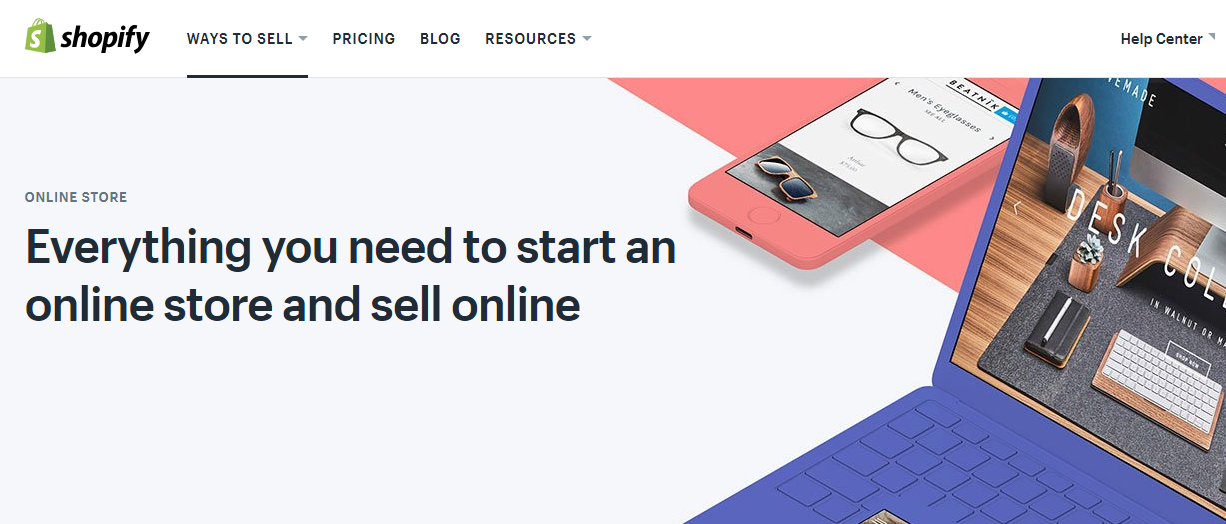
Shopify recorded its billionth order in the second quarter of 2018.
That single statement says a lot about Shopify and why we’re mentioning it in this list.
Shopify comes with an entire eCommerce solution that allows you to set up an online store with complete ease. By enabling Shopify Development Service, you gain the freedom to organize your merchandise, easily customize your storefront, track orders, and accept payments with just a few clicks.
Shopify is an excellent choice for small and medium-sized businesses looking for an easy-to-use platform. However, for businesses that require advanced customizations, integrating professional ecommerce website development services can enhance the store’s functionality and user experience.
The administrative interface of the store comes in English, all other things like email conversation, checkout, etc. comes in other languages. Just like BigCommerce, Shopify is one of the very few platforms that can be used by all three kinds of businesses – small, medium & large. BigCommerce and Shopify are often compared as both the eCommerce platforms are widely accepted and offer superiority to the users.
So, what’s new with Shopify?
It has Shopify Plus – an eCommerce platform with advanced functionality. It helps in growing your business by providing a large space of 2 terabytes of storage. Shopify Plus simplifies your backend workflows and lowers down complexity, and some other features like:
- Going international with a multi-lingual store.
- For high-value customers, set a wholesale channel.
- As your team grows, feel free to create unlimited staff accounts.
- Transaction fees are lower with Shopify Plus.
- Shopify Plus has a higher level of support
Along with BigCommerce, Shopify has captured a large portion of eCommerce industry today. You can safely say, these are the two best eCommerce platforms for all three size of business viz. Small, Medium, and Large.
If you’re thinking about using Shopify for your online store, it’s a good idea to get help from Shopify experts. They’ll make sure everything works smoothly so your customers have a great shopping experience.
PSDCenter has a broad panel of Shopify experts, and we have developed some outstanding themes for future stores. Don’t forget to check them out.
Shopify Themes Shopify Experts
Here are some advantages and disadvantages of Shopify you should know:
Advantages
- You can set up an online store instantly.
- You don’t need any coding knowledge to set up your store.
- You can contact a reliable Shopify agency to optimize your store. There are numerous experts our there who can help you!
- The customer support of Shopify is very good.
- Just like BigCommerce, so many cool Shopify themes are available.
- The platform has tons of apps and add-ons to give more power to your online store.
- Shopify Lite plan is available that can be a great option for many small businesses.
- Shopify also offers great SEO features, just like BigCommerce.
- Shopify has a PoS system that can be integrated with your online store as well.
- Retailers can also use another Shopify POS system that works with PCs and tablets.
Disadvantages
- You often have to rely on third-party apps to get things done.
- Transaction fee on every payment gateway transaction.
- You may face content limitations in many Shopify themes.
3. 3dcart
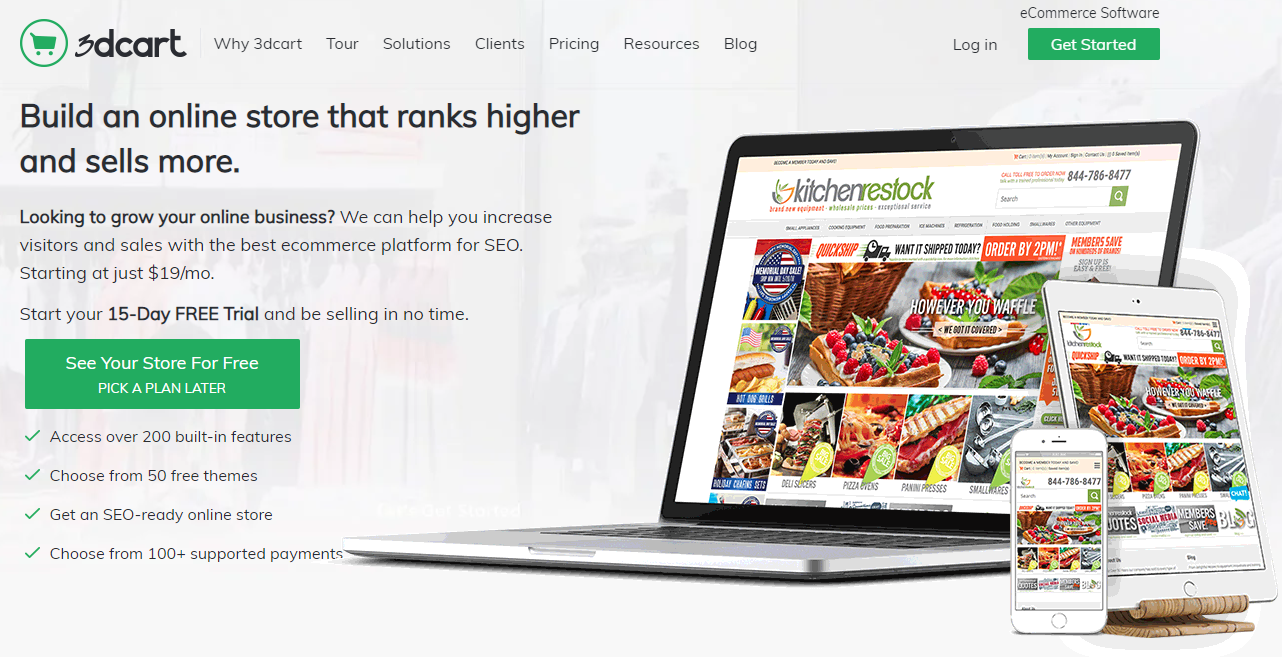
3dcart combines everything you need to sell products online. It helps you in creating, designing, marketing, and managing your store with built-in features. It allows you to control online as well as offline payments, deal with your inventories, set up real-time delivery options etc. You don’t have to worry if you don’t know HTML, CSS, JavaScript or any other programming language.
Just like Shopify, 3dcart has a wide field for developers, so there’s much external help you can take for theme development or any other modification for your online store. PSDCenter is one of the biggest certified developers in 3dcart for more than 10 years, so you can safely rely on us when it comes to 3dcart. Check out our themes and development services for 3dcart.
3dcart Themes 3dcart Development
Here are some advantages and disadvantages of 3dcart you should know:
Advantages
- Variety of checkout options are available in 3dcart.
- 3dcart offers unlimited storage to the users.
- Great SEO features and social media integrations.
- You can develop a decent looking responsive store with 3dcart.
- 3dcart is continuously updating the platform to offer the best services.
Disadvantages
- There are free themes available, but you might be disappointed with the quality.
- The dashboard is not very interactive and informative.
- You might need to invest some time in understanding the entire platform, unlike BigCommerce or Shopify.
4. LightSpeed

LightSpeed is the world’s most dominant POS (Point Of Sale) and eCommerce software. You can create an omnichannel shopping experience for your customers and bring them back frequently. Customers will enjoy this reliable and spontaneous POS system and eCommerce solution.
LightSpeed OnSite gives the leverage to all the retailers to have command over their physical as well as online store. You can also manage functions, enjoy multi linguistic options choosing default language as per your choice, handle sales & customers from your system.
Here are some advantages and disadvantages of Lightspeed you should know:
Advantages
- The initial level of editing and customization is very easy in Lightspeed.
- Lightspeed gives you unlimited bandwidth usage.
- Lightspeed comes with great SEO and social media marketing features.
Disadvantages
- There’s only one plan available in Lightspeed and may not be a good option for small businesses.
- Lightspeed themes are billed monthly, and that might be a problem for a lot of small businesses out there (in terms of cost).
- If you make edits in the theme codes & CSS, Lightspeed will not give you any support services.
- The payment integrations are very limited compared to other eCommerce platforms that we’ve seen.
5. Yo!Kart

Yo!Kart is a leading eCommerce marketplace platform that can build multi-vendor websites like Amazon, Etsy, or Alibaba. It is self-hosted and available at a one-time price with no hidden or recurring charges. It is extensively customizable and tested for high-performance scalability.
Unlike Shopify or other SaaS-based eCommerce platforms, Yo!Kart is an entirely standalone solution, and you will need no plugins to launch a multivendor marketplace. It is a perfect eCommerce platform for small and medium sized businesses.
It comes with multiple business APIs pre-integrated, out-of-the-box. So you can launch a marketplace with 20+ payment gateways, automated tax management, analytics, accounting, shipping fulfillment provider, and many other APIs integrated.
Prices for comprehensively compiled packages start at the US $999 which includes a License for lifetime use, complete source code ownership, up to 1 year of technical support, and other allied services.
Also, Yo!Kart team has recently launched a B2B marketplace solution with in-build B2B functionalities like RFQ, minimum order quantity, and so on. The pricing for Yo!Kart B2B starts from $1499.
Advantages:
- Whitelabel multi-vendor eCommerce platform
- Feature-rich product catalog
- Personalized vendor storefronts
- Multi-currency and multilingual with RTL support
- No transaction fee or any recurring charges
- Multiple revenue streams supported and compatible with various eCommerce Business Models
- Customizable solution and supported by a team for end-to-end customization services
- Free technical support up to 12 months
Disadvantages:
- Limited themes available
- Updates, if needed, have to be purchased
6. Magento

Magento holds the second rank in the eCommerce market share in 2017. Magento is an open source eCommerce platform with tons of exciting features. One of the benefits of open source eCommerce platforms is – you get tons of exciting themes. Although, you might need Magento developers to set up your online store, as coding is an integral part.
With Magento, there are endless possibilities when it comes to customization. That’s why big brands usually go for Magento as they have money and resources to build the best eCommerce store. If you have enough funds and time to create a feature-rich online store, Magento website development service is the answer. You can hire a good Magento Development Company, and create a store with endless features.
Here are some advantages and disadvantages of Magento you should know:
Advantages
- Magento has a vast community that continually helps in developing the platform and fixing the bugs.
- Magento has many templates to choose from and Magento add-ons & widgets are updating and evolving.
- Magento stores perform very well in terms of SEO.
- The online stores are mobile friendly.
Disadvantages
- Magento requires a very powerful hosting environment.
- You need ample space and memory to perform your site well.
- You need Magento developers to customize your store at the complex level.
7. WooCommerce

WooCommerce holds the biggest eCommerce market share in the world. WooCommerce holds around 11% of the total eCommerce market. Basically, WooCommerce is a WordPress plugin that can turn any website into a fully functioned eCommerce store. It’s an open source plugin and gives features like inventory management, coupons, product pages, etc.
It also create personalized coupon codes for woocommerce automatically and helps to engage with your customer by automated coupons.
Although, there is much external development you might need to enhance your store. There are certain downfall WooCommerce as well that leads to eCommerce replatforming.
Here are some advantages and disadvantages of WooCommerce you should know:
Advantages
- WooCommerce offers limitless customization. You can literally design the store of your dream.
- It’s an open-source platform, hence java development services are always there to guide, help and upgrade.
- WooCommerce stores are compelling in terms of SEO performance.
Disadvantages
- You will not get quick support like BigCommerce or Shopify.
- You need experts with WordPress knowledge to build an online store.
- WooCommerce stores often face security issues. If you have code on GitHub, it’s crucial to regularly perform a GitHub backup to ensure your data is safe and recoverable in case of any unexpected events.
8. Wix

Wix has gained a lot of popularity because of its simple interface and affordable prices. To use Wix, you don’t need any coding knowledge. You can simply drag and drop components and create beautiful online stores. Just like other platforms, Wix has more than 510 templates you can try your hands on. Templates are available for electronics, food & drinks, fashion, sports, custom clothing, and many other niches.
Wix also helps in creating a stunning online store for mobile devices. As we all know, mobile stores are gaining more and more attention, Wix is the eCommerce platform you can use for this purpose.
Here are some advantages and disadvantages of using Wix as an eCommerce platform:
Advantages
- There are multiple template choices available.
- The plans are very affordable compared to other eCommerce platforms.
- Wix Help Center has tons of articles and tutorials that can guide you to create an online store.
- The free plan never expires. Although, you can’t sell online with a free plan, but Wix gives you endless time to create and customize your online store.
Disadvantages
- Wix is an excellent option for starting an online store. However, it may not be a good option for a large-scale online store. You can initiate your business with Wix, but as you grow, you might have to shift to bigger eCommerce platforms like Shopify or BigCommerce due to less customization in Wix.
- Once you choose a Wix template, you’re kind of stuck with it. Wix has its custom codes, so it’s hard for you to migrate as well.
9. Squarespace

Squarespace is another widely accepted SaaS eCommerce platform with beautiful templates and design capabilities. It offers a great collection of themes, so you really don’t have to worry about finding the right template for your business. You might have to try your hands on Squarespace editor before you jump into designing your site. Even though it’s a drag-and-drop editor, but not as smooth as Wix. So you might need a little practice.
If you’re unfamiliar with the Squarespace interface, learning how to edit the navigation bar in Squarespace can help you make your site more user-friendly and professional-looking.
Here are some advantages and disadvantages of using Squarespace as an eCommerce platform:
Advantages
- Premium Squarespace templates are feature-rich, and the collection covers a wide range of industries. There are also great collections of Squarespace plugins to further extend a site’s functionalities.
- Template designs are responsive. That means, your online store will look pretty good on mobile devices.
- The style editor gives you great options to edit fonts, colors, images, sidebars, background images, and pretty much everything without any coding knowledge.
Disadvantages
- Addition of rich snippets is a bit tedious in Squarespace.
- “Personal Plan” is inferior in terms of features.
- You can’t import and export digital products.
10. Volusion
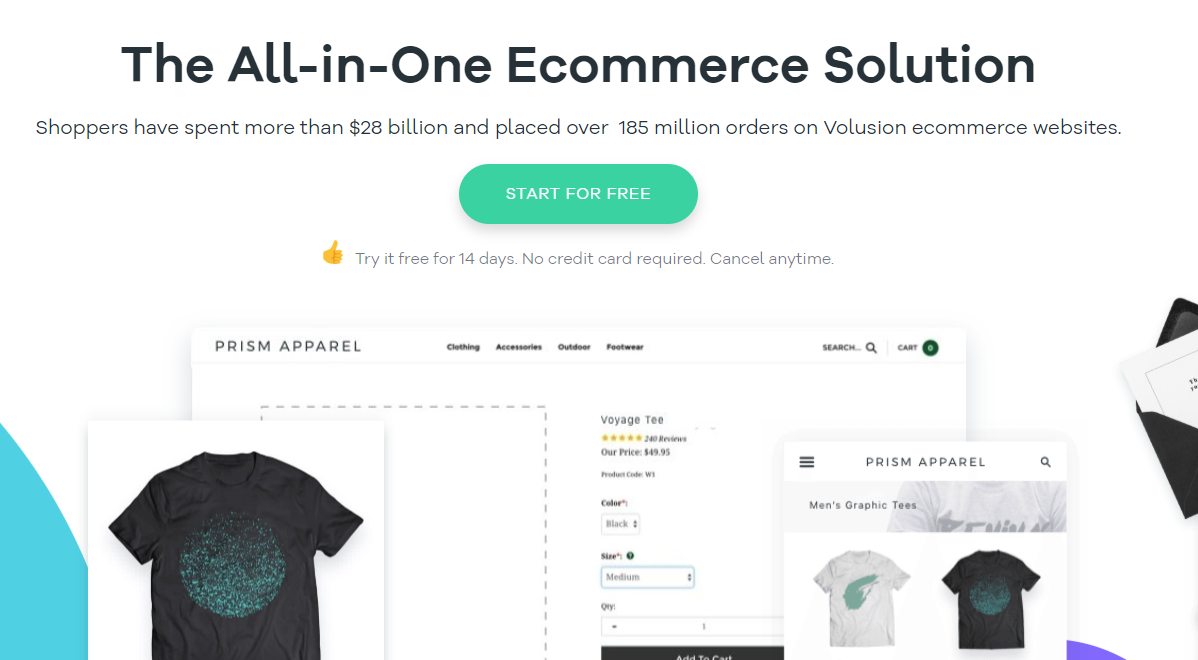
Volusion is one of the leading hosted eCommerce platforms that focus on providing a full kit for businesses with inventory management, customer management, marketing features, and much more. One of the best things about Volusion is, it has great customer support. There’s tons of learning material available already on how to build an online store with Volusion, so you’ll find every answer. With Volusion, you don’t have to be a nerd if you want to build an online store. Volusion is running over 30,000 online stores and has helped these stores to sell over $26 millions of goods. Those are some high numbers!
Here are some advantages and disadvantages of using Volusion as an eCommerce platform:
Advantages
- Volusion offers a comprehensive set of tools that can help you build a great online store without much coding knowledge.
- As we mentioned, there’s 24×7 support from Volusion. So, ask any question from the beginning to the end.
- Volusion doesn’t charge transaction fees in its lower plans.
Disadvantages
- Every plan has a bandwidth limit, so after a certain point, you need an upgrade.
- You have to pay extra bucks for SSL certificate.
- Volusion doesn’t offer a built-in blogging function.
11. PrestaShop
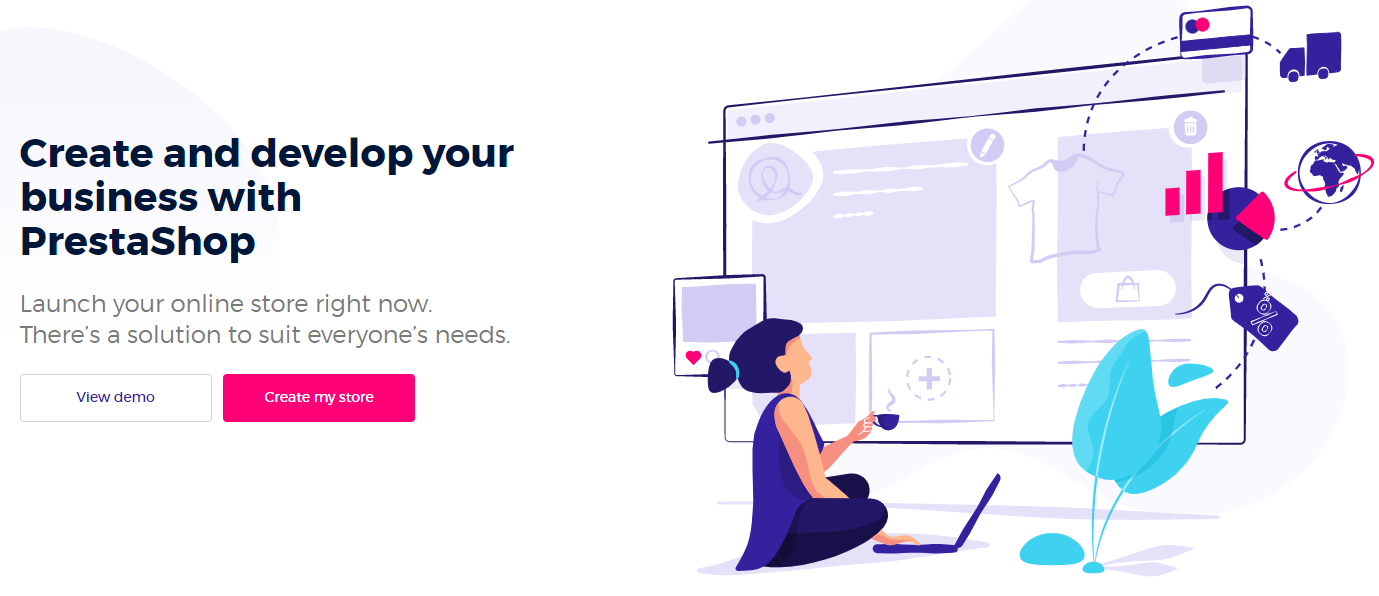
PrestaShop was launched in 2007 and gained tremendous popularity in these years because of its customization features. PrestaShop is responsible for over 2,70,000 stores worldwide today. It’s an open source shopping cart, that means you can download it for free. That doesn’t mean it’s a zero cost shopping cart; you still have to pay for web hosting, dedicated servers and other modules to complete your online store.
PrestaShop can be a good alternative for those who have an in-depth knowledge of HTML, CSS, and PHP or who can hire someone who has. Apart from downloadable version, PrestaShop also introduced a hosted version called “PrestaShop Ready” couple of years back. If you’re thinking PrestaShop as one of your options, here are some advantages and disadvantages you should know.
Advantages
- PrestaShop is an easy to install software; there’s no hassle involved.
- PrestaShop is very easy to use and has a very friendly interface.
- PrestaShop is a popular platform hence the support is available for many languages in many countries.
- It is an open source resource that means anybody can start with it.
Disadvantages
- Even though the platform is open source, it is dependant on HTML, CSS, and PHP. Small businesses may not find PrestaShop as a good fit as they have to hire resources.
- The free version is okay to set up a basic store, but you have to purchase some modules to set up a decent store.
12. Zopping
Zopping is an all-in-one eCommerce platform that enables businesses to easily create, customize, and manage their online stores without coding.
With mobile-ready designs, secure payments, and marketing tools, Zopping enables seamless online selling across various industries, including fashion, grocery, restaurants, and more.
Zopping is the perfect eCommerce platform for businesses of all sizes, from small retailers to large enterprises.
Whether you sell groceries and FMCG, home and furniture, jewelry, fashion and apparel, bakery and dairy products, fresh meat, electronics and gadgets, pharmacies and healthcare, or food and beverages, Zopping provides seamless store management, secure payments, and built-in marketing tools to help you grow online effortlessly.
Advantages:
- Easily create and manage your eCommerce store
- Streamline orders from multiple channels (OMS)
- Organize and showcase your products effectively.
- Secure and diverse payment methods for your customers.
- Gain insights with detailed sales and customer reports.
- Manage your customers and their orders with ease.
- Explore and choose from a variety of business-ready templates.
- Manage delivery zones by pin codes or distance.
- Integrate and optimize delivery partner management.
Disadvantage:
- Limited inbuilt theme options for online stores
Which eCommerce platform is right for you?
| Platform | Small Business/Startup | Medium Scale Business | Large Scale Business |
| BigCommerce | ✓ | ✓ | ✓ |
| Shopify | ✓ | ✓ | ✓ |
| 3dcart | ✓ | ✓ | |
| Lightspeed | ✓ | ||
| Magento | ✓ | ✓ | |
| WooCommerce | ✓ | ✓ | |
| Wix | ✓ | ✓ | |
| Squarespace | ✓ | ✓ | |
| Volusion | ✓ | ✓ | |
| PrestaShop | ✓ | ✓ |
For small and medium businesses, BigCommerce and Shopify are the best eCommerce platforms available. These are the two platforms making constant efforts to provide the best services to these two segments of business. As these two platforms are great with scalability as well, large enterprises can also consider these two eCommerce platforms.
For medium scale businesses, all these eCommerce platforms are suitable, depending on their budget and manpower. But all these platforms hold enough potential to help a medium scale business.
Talking about large-scale businesses, Magento, WooCommerce, and PrestaShop can be a good fit, but they might ask you for external resources. All though, BigCommerce and Shopify still hold enough command to help a large scale business. But, it all boils down to personal preferences after a certain point.
Do share your thought regarding this article in the comment section below. Also, let us know your experiences with all these eCommerce platforms.
Cheers!

[…] Source: 10 Best ECommerce Platforms For Small, Medium & Large Scale Enterprise […]